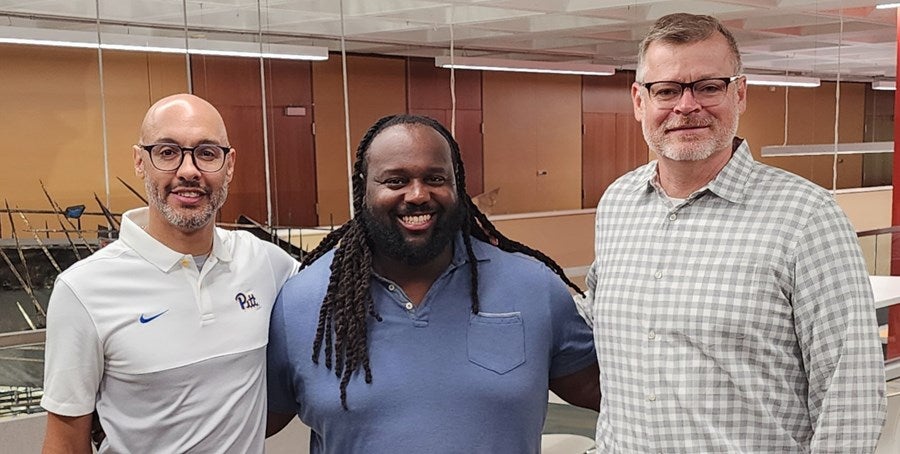You are here
Pitt IT and NLA: Teaming Up for Teens

How do you help students in low-income, underserved neighborhoods dream big and believe that a college degree and professional career are within their reach? The Neighborhood Learning Alliance (NLA) is dedicated to doing just that, with programs designed to improve education and opportunities for K – 12 students in and around Pittsburgh. NLA’s High School U is a free program that enables high school students to enroll in college courses while participating in paid work experiences. Pitt IT had the extraordinary chance to partner with NLA this summer in a new High School U track focused on tech careers. Here’s how we teamed up with this incredible nonprofit group to benefit area teens.
Building Programs to Bridge the Divide
Kashif Henderson is the executive director of NLA and spearheaded the expansion of High School U (HSU), which began in 2015, to include technology training, in addition to nursing, healthcare, business, and entrepreneurship tracks. HSU has since expanded to include paid work, which supports low-income students who may not otherwise be able to participate because they need paid part-time jobs. This also provides valuable experience that can set them apart when applying to college, finding internships, and getting campus job.
“We focus on exposing students to college and gaining work experience in a professional setting. Many times, they don’t have those opportunities because of their zip code or the community they are living in. We aim to create programs that bridge that divide,” says Henderson.
NLA contacted Pitt’s Office of Engagement & Community Affairs (ECA) about placing students in IT positions that corresponded with what they were learning in the Computer Fundamentals and Applications course they would be taking at CCAC. ECA connected Henderson with Pitt IT. Engagement leader Kate Ulreich and her colleague, customer success manager Chris Field, were thrilled at the opportunity to support NLA.
“Pitt IT really prioritizes community outreach and workforce development. We’ve partnered with Pitt’s Community Engagement Centers and other programs to educate traditionally underserved youth on IT careers ranging from user support to cybersecurity. When Kashif reached out to us, we were excited about the opportunity to host students from the community on Pitt’s campus and show them what working in IT is really like on a daily basis,” says Ulreich.
Getting a Glimpse into a Tech Career
Ulreich and Field reached out to their Pitt IT colleagues and other campus partners to identify and create appropriate opportunities that would be a positive experience for everyone involved. Pitt IT’s Endpoint Support team, led by Jeremy Mayhew, volunteered to host a half dozen students, while Athletics and Health Sciences each also offered to host a student.
The students came to work at Pitt every morning, where they shadowed employees, worked on joint projects, learned about career paths, and created connections with mentors. Students then attended the Computer Fundamentals course at CCAC in the afternoon, where they learned the basics of computers, the Microsoft 365 suite, and computer networking.
While some students entered the program with an understanding of computers, others did not. Field noted that it created a great mix of experience levels where students both learned and supported each other. “I met the students working for Pitt IT, and they were really great young people who were eager to learn and help.”
Mayhew was eager to engage students to a range of activities that are common in entry-level tech jobs. “We’re trying to expose them to a varied and rigorous set of tech tasks — the kind of break/fix needs that aren’t always taught in class, but can be a big part of real-world tech support," he says.
Creating an Impact
Many universities value applicants who have already taken college-level courses, but not all schools offer these classes. High School U gives students the opportunity to earn real college credits and gain relevant work history, thus making higher education more accessible.
“My theory is all about access,” Henderson says. “We have to look at how we’re building pipelines and access points for our students, especially students who don’t have the resources they might need. Students need mentorship; they need to build networks and have champions in their corner.”
Mayhew hopes that Pitt IT’s partnership with NLA can help these students envision themselves as IT professionals. “A lot of students don’t know what’s available to them and what they are capable of. I hope they now feel more confident that they can get a degree and have a good career, not just a job. If they end up at Pitt, I’ll happily welcome them as student workers.”
Pitt IT is proud to support the NLA in their efforts, recognizing that technology has the capacity to transform the way people live, learn, and work. “Our common purpose is to empower the larger Pittsburgh community. We want the students to see Pitt as a place where they belong, not just that place in Oakland,” Field says.
Pitt IT recognizes that the University is stronger when we take care of our community and contribute to continued growth in the region. We hope to see these students return to Pitt in a few years as proud Panthers and, perhaps, as a Pitt IT Tech Ambassador or IT Help Desk consultant!
